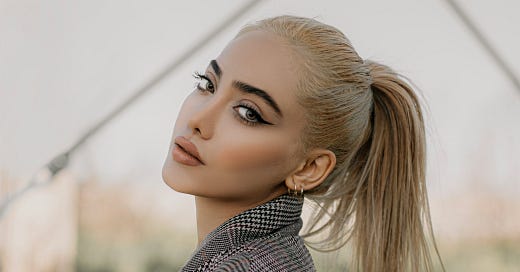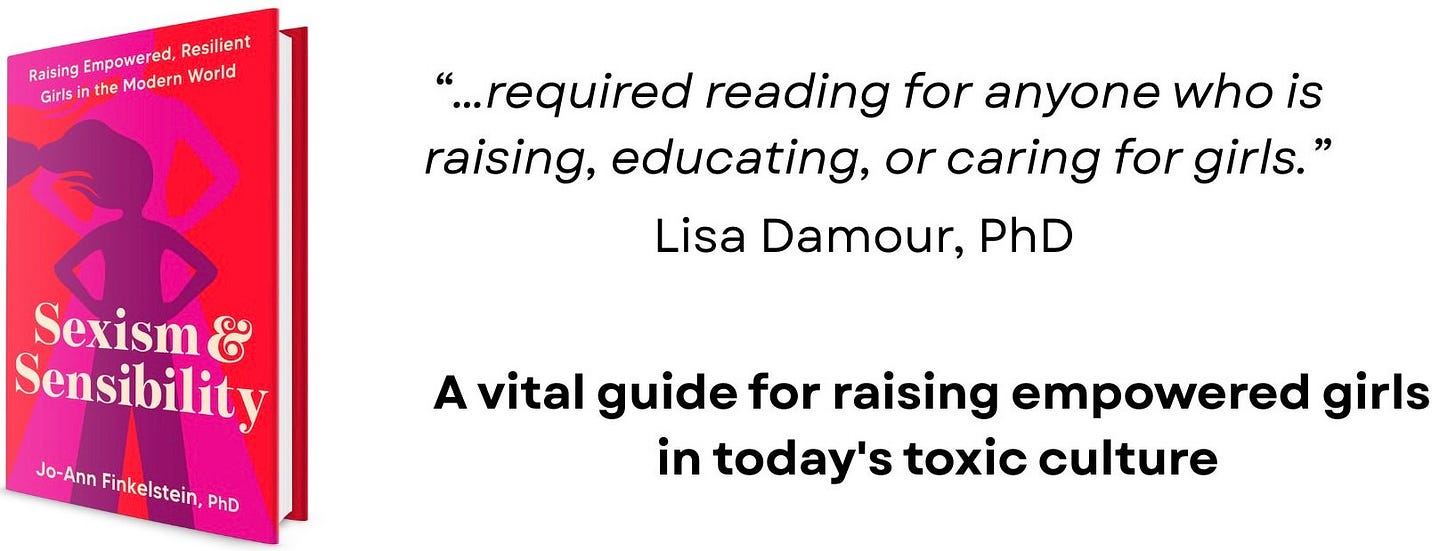Usually a paid subscriber perk, I’ve made it free for everyone to listen to me read this post.
NOTE: This is my first in a series of “Dear Daughter” letters in the lead up to Mother’s Day. I’ve got a few short posts for you this week, so stay tuned. And don’t miss the big Mother’s Day sale at the end of this post!
Dear Daughter,
I’m giving you this letter now because it’s Mother’s Day—so you kind of have to read it, right? Still, I hope you take something from it. Maybe not all at once, but little pieces you can return to when the world makes you question your worth.
You already seem so savvy and know more than I did at your age. You’ve got endless information at your fingertips. But there are some things I need to say—things the internet won’t always tell you, and the culture around you makes confusing.
There’s a message being whispered—and sometimes shouted—at girls every day: shrink yourself. Shrink your body. Shrink your voice. Shrink your dreams. Blend in. Be pleasing. Be perfect. Be quiet. Be small.
I see it when you’re interrupted, or in the silence that follows when you say what you really think. I see it in the way girls vacillate between feeling like too much and not enough, always trying to find the elusive just right.
And I see it in the faces that all start to look the same—which brings me to part one of this letter—yes there are more parts to come, lol. Go ahead, roll your eyes, I get it!
But I want something different for you. I want you to see through the insidious madness—and beyond it.
I saw a TikTok the other day of a young woman’s before and after videos of her nose job. In the first clip, she is zoomed in on her nose. It big—huge even—with large nostrils. As she zooms out, her nose is still prominent but it just sort of becomes part of who she is. It suits her look; her energy. She has character. She’s cute. If you’re not sure what I mean, think of Aimee Lou Wood from Sex Education and The White Lotus—her big, gapped teeth aren’t flaws; they’re just her. From my woman-of-a-certain-age vantage point, the girl in the video looks the same: like herself—a distinct, original human being. Her face isn’t so unusual or “flawed” that surgery feels necessary—just real, and really hers.
And yet, I completely understand why she did it.
I bet she’s spent a lifetime being mocked by girls and guys alike, considered undateable—even by those who may have had a crush on her but worried what their friends would think.
But I’m also guessing her nose wasn’t a life-ruiner, either. At least, in my hopeful version, she had real friends, found her people, and probably started dating in college—happily escaping the ultra-superficial guys. But it’s so hard to shake the messages we get as kids. Like you, she’s growing up in a world that convinces girls it’s possible to be flawless, that flawless is a worthy goal—and that flawless means looking like everyone else.
Or maybe, given the relentless focus on girls’ appearances, she was just tired of her nose being the first thing people noticed when they met her, or of being known as the girl with the big nose—as opposed to the girl who plays guitar like an angel or just the super kind or funny girl. She no longer wanted the reminders her nose brought of painful childhood bullying.
The “after photo” is what really got me. She didn’t look like herself. She looked so different; so generic. She now had the culturally preferred nose—straight, with a slight upward tilt at the tip—but her face was like a snapchat filter come to life. Commenters agreed she looked great—like a model even—with her new nose and new hair color, surmising that she’d probably had lip filler and other work done too.
Please know this isn’t a dig at this young woman. It’s her body—she can do whatever she wants with it—and, honestly, I would probably have made the same decision as a teenager. But this is a commentary on what our culture rewards—what’s “culturally preferred.” There’s a single, “cyborgian” look being pushed on your generation: the polished, filtered, Instagram face.1
Look, impossible beauty standards for girls and women existed when I was growing up too. I mean, heroin chic was an actual thing. We fawned over models that were emaciated, made to look like the stereotype of a drug addict with pale skin, dark eye circles, and stringy hair.
These days though, filters, editing apps and more accessible cosmetic surgery have taken the homogenized beauty ideal to a whole new level. Every time you open your phone, you’re being convinced you should have poreless skin, high cheekbones, catlike eyes, a small nose, and full lips so that, as one of my favorite thinkers put it, you look “distinctly white but ambiguously ethnic."2 Omg, I’m realizing as I quote that—that is exactly what the girl in the video looked like in her after photo!
I want you to know that every single teenager feels awkward in their body and that girls, especially, believe changing things about their appearance would alleviate that.
It won’t.
It’s part of growing up—and part of being steeped in the relentless, often cruel pressures of beauty culture. I know so many girls and women who have wrangled their bodies into “culturally preferred thin bodies,” who have increased and decreased their breast sizes, committed to expensive skin care regimens, and botoxed their wrinkles. It hasn’t made a measurable difference to their happiness. Why? Because how we feel about ourselves runs far deeper than our appearance—and even if it didn’t, the “culturally preferred” goalpost is always moving.
I’m sorry to have to say this, but our culture doesn’t want women to feel secure. Your work—really, all of our work—is to untangle your sense of worth from an ideal shaped over centuries by men in power—men who saw women not as full human beings but as objects to be controlled, adorned, and made useful to male desire and systems.
Your body isn’t the enemy.
The real enemy is anything that stands in the way of treating your body with kindness and respect. Anything that makes you focus more on how you look than on the substance of what you contribute to the world. Anything that makes you feel like you should look like everyone else.
The wish to feel accepted is human nature. But always remember this: because true belonging only happens when we present our authentic, imperfect selves to the world, our sense of belonging can never be greater than our level of self- acceptance.3
If you want to love your body, you’ll have to fight for it. When everyone’s chasing the same face, choosing your own is an act of rebellion.
NEW OFFER: Take 50% off a one-year subscription if you buy my book, Sexism & Sensibility: Raising Empowered Resilient Girls in The Modern World (makes a wonderful gift too). That’s a book and a one-year subscription for less than the price of a one-year subscription. Just reply to this email with a copy of your receipt and I’ll send your unique link.
Buy or gift my book Sexism & Sensibility: Raising Empowered Resilient Girls In The Modern World
or buy it anywhere you’d like!
RELATED POSTS:
Gen Z, Your Vagina is Fine!
A Favor: If you like this post, please click the ❤️ above or below. It helps other readers find it
Jia Tolentino from “The Age of Instagram Face” in The New Yorker
Jia Tolentino from “The Age of Instagram Face” in The New Yorker
Brene Brown from her book Daring greatly: How the courage to be vulnerable transforms the way we live, love, parent, and lead.









This is so wise. And I see women who look the same at every age and stage of life. It’s hard to tell us apart. Lots of social pressure. Like you, I’m enjoying the more quirky folks.
"the “culturally preferred” goalpost is always moving."
Very true, thank you ✨